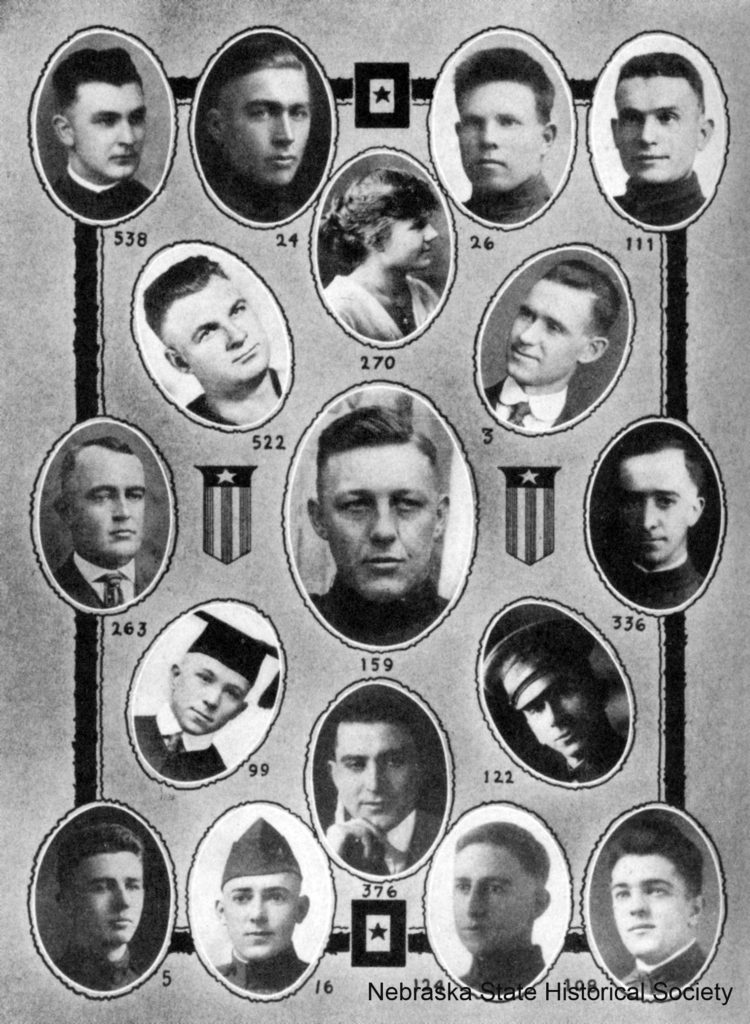We had a reader response to “The Best War I Ever Expect to Have: Hall County Doughboys’ Letters Home” by Daryl Webb, which ran in the Spring 2016 edition of Nebraska History. Read Dr. Frank Edler of Lincoln, NE’s response below: First, I’d like to say that I appreciated Webb’s article focusing on this issue and discussing the letters of the Nebraska soldiers of the American Expeditionary Forces, especially the ones dealing with the reasons for enlisting, the conditions of trench warfare, and the yearnings for returning home.
 Some of Hall County’s veterans. From History of Hall County Nebraska, 518.
Some of Hall County’s veterans. From History of Hall County Nebraska, 518.
I was concerned, however, with the lack of context in the section dealing with the Nebraska State Council of Defense and its history (along with the county councils of defense) during the war period. The best work on the Nebraska State Council of Defense is still Robert N. Manley’s master’s thesis at UNL entitled “The Nebraska State Council of Defense: Loyalty Programs and Policies during World War I” (1959) under the supervision of James C. Olson. Manley also wrote a good article for Nebraska History entitled “The Nebraska State Council of Defense and the Non-Partisan League, 1917-1918” (December 1962) as well as another article entitled “Language, Loyalty, and Liberty: The Nebraska State Council of Defense and the Lutheran Churches” which appeared in the Concordia Historical Institute Quarterly (April 1964). Frederick Luebke who taught history at UNL has also written on this theme such as his book Bonds of Loyalty. German-Americans and World War I (Northern Illinois University Press, 1974). There is an article too by Luebke in the Concordia Historical Institute Quarterly entitled “Superpatriotism in World War I: The Experience of a Lutheran Pastor” (February 1968). The author does not seem to be aware of these works. What troubles me about this lack of research is that the author believes that the State Council of Defense was “an organization created to ensure loyalty” (p.36). Actually, the State Council was created to coordinate the war efforts of the state of Nebraska, not to ferret out disloyalty. The state legislature went beyond the Constitution in creating an extra-legal entity which could arbitrarily subpoena witnesses, examine them without any legal representation and enforce fines on them. It was Richard L. Metcalfe and other members of the Nebraska State Council who decided to devote the first report of the Council entirely to the question of so-called disloyalty in the German-American community, the Lutheran Church, and the University of Nebraska (12 professors and one staff member were tried for disloyalty in late May and early June of 1918). What the author does not say is that the Council thought itself above the law and beyond the reach of judicial review, as Manley has shown in his articles. Through the Council’s use of the Espionage Law of 1917 and its amended version known as the Sedition Act of 1918, freedom of speech, freedom of assembly, and freedom of the press were literally eliminated not only for the duration of the war but also for the period known as the Red Scare after the war (and this occurred across the country as well).
 Grand Island Independent, October 3, 1817, 3
Grand Island Independent, October 3, 1817, 3
In addition, the State Council tried to drive out the Non-Partisan League, a strong farmers’ organization from North Dakota that had begun organizing in Nebraska in 1917. The Council sanctioned local councils to forbid League meetings in an attempt to keep the League out. Moreover, the Council and Governor Neville looked the other way when vigilantes broke up League meetings, beat up organizers, or threw them in jail without warrants. As Addison E. Sheldon said on page 919 in the first volume of his work Nebraska. The Land and the People (1931), “A military despotism, so far as it was useful or usable, was set up in America. Back of it was to be marshaled the public opinion of the people. And that public opinion was to crush and flatten down, like a steam roller on a bumpy road, whoever raised his head or his voice in any way to diminish the war power.” We always welcome reader responses! If you have a question or comment about anything you read in Nebraska History or on this blog, please email [email protected].



